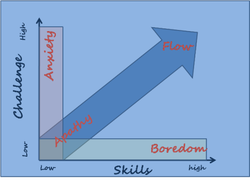
Now don't get me wrong. I have the utmost respect for every single volunteer member of a Board of an independent school, or any not-for-profit for that matter. They are generally selfless, committed, and altruistic to a fault. Having said that, they are not all necessarily effective at what they do. The problem is not desire, or dedication. The problem is that their approach and skill sets fall outside of the operational zone of the Board. The are either underprepared for the complex issues being discussed or, just as problematic, they are over qualified for the low level discussions and decision-making that the Board has focused on. What is the zone of performance for a successful and valuable Board member? It's really pretty simple. It all depends upon the operating style of the Board.
In his research on motivation and engagement, psychologist Mihaly Csíkszentmihályi summarized some not so surprising general findings about engagement and productivity in his book: Finding Flow. In essence, he identified what it’s like to be in the flow, which he described as the ultimate self-motivation. According to Csíkszentmihályi when people experience flow they typically:
- are completely involved;
- merge action and awareness - concentration is focused on what is being done and a single-mindedness takes over;
- exclude distractions from their consciousness;
- don’t worry about failure - they are too involved to be concerned about failure;
- have a distorted sense of time - generally in flow people forget time, allowing hours to go by without any real awareness of their passage;
- see the activity as an end in itself - activities which are seen as valuable in their own right, worth doing for their own sake.
So how can Boards organize themselves so that these situations don't develop? Csíkszentmihályi found that flow can only be achieved when the work you are doing:
- has clear goals requiring appropriate responses;
- provides immediate feedback - there are clear measures of success or benchmarks to be achieved; and,
- requires skills which are fully involved in overcoming challenges that are just manageable - high challenge matched with high skills.
In the first case, one answer might be to provide professional development for your Board members to address any perceived deficits in skills, experience or knowledge. Sometimes a brief primer or backgrounder on an issue (as pre-reading before the meeting) can get everyone up to scratch without taking extra time to stop and explain or answer basic questions during discussions.
In the second instance, it is the responsibility of the Chair and Head, as well as the Governance Committee to ensure that the issues being discussed are strategic and significant, not mundane and operational.
Take a look at the chart at the top of the blog. Does your Board (or Leadership Group; or Committee; or typical staff meeting; etc.) have flow?

 RSS Feed
RSS Feed